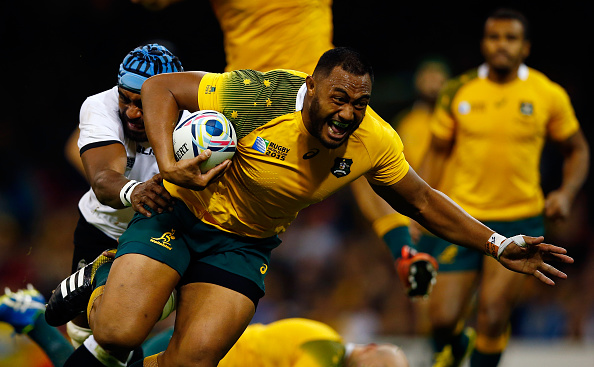Australia had to wait five days from the start of the World Cup to play their first game, so will be happy enough with the bright start they made in a 28-13 win over Fiji. What issues did the game raise for the Wallabies?
Will they regret missing out on a bonus point?
A 28-13 win over Fiji isn’t a bad start to a World Cup campaign, but Australia’s failure to score a fourth try and thereby take five match points from this game could come back to haunt them.
England took the full five points from Fiji in the opening match of the tournament last weekend and Wales did the same against Uruguay, but even though Australia scored their third try with 38 minutes of play remaining, they didn’t cross the whitewash again.
With 12 minutes to go and the score 25-13, Australia opted to kick a penalty and take their lead out beyond two converted tries, rather than kicking to touch and going for a try from a driving maul – a tactic which had gleaned them two first-half tries.
Head coach Michael Cheika said afterwards: “We haven’t even thought about bonus points,” which, if true, is astonishingly naïve.
Pool A has looked like being a fight to the death, where every point – and even points difference – will count. Australia’s decision to let that bonus point go begging may be one that they rue next month.
Is Michael Cheika’s tinkering with selection counter-productive?
The process of selecting a 31-man World Cup squad undoubtedly means different combinations have to be tried in the run-up to the tournament. However, Cheika made so many changes during the Rugby Championship and Bledisloe Cup matches that it begs the question of whether Australia’s team is actually settled enough to reach its full potential in the next month.
The fact that at 25-13 up with 12 minutes to go against Fiji, they were still worried about closing out the win, rather than gunning for a bonus-point try suggests that the combinations aren’t quite comfortable enough with each other. Their starting XV against Fiji boasted 720 caps, but do the individuals trust each other and the game plan enough? The fact that Cheika will change most if not all of his run-on team for Sunday’s clash with Uruguay, because of the short turnaround, means the combinations won’t have more time to settle before they play England on 3 October.
Is Australia’s scrum still a weakness?
Australia and Fiji produced some of the most stable scrums seen in Test match rugby for a long time, but it was noticeable that while the Wallabies mostly held firm against the Fijian eight, hooker Stephen Moore couldn’t strike the ball and needed his pack to drive over it to claim the possession instead.
This took quite some time in several scrums, which meant scrummaging ball did not equate to quick ball for Australia. It also meant the forwards expended a lot of energy. At the second scrum of the game, Fiji got a strong secondary shove on, and turned possession over and the English and Welsh coaches and players will have noted that. Yes, Australia’s scrum is better than it used to be, but is it good enough?
Are Pocock and Hooper the best back-row option?
David Pocock is playing out of position at No 8 so he and openside Michael Hooper can feature in the same team. They both played a major role in the win over Fiji, with Pocock touching down two tries from lineout drives, Hooper making 22 tackles and Pocock 16.
Cheika was certainly pleased with them, saying: “He (Pocock) worked hard and was in the tackle contest area a lot. It’s obviously a strength of his so we want to try and put him there or thereabouts so he can have a bit more of a roving mission in defence. But he also did his business well in attack, too. He had his technical stuff right. Both himself and (Michael) Hooper were very good around there and their work rate off the ball.”
Assistant coach Stephen Larkham said the duo gave the back row good balance as Hooper is particularly strong in attack and Pocock thrives at the breakdown, but Larkham also admitted there might be a downside to the duo playing in tandem.
“When you pick two relatively short back-rowers – I guess these two are, in terms of the world stage – sometimes your lineout struggles.”
Larkham hoped Scott Fardy was good enough in the lineout to counter that problem and Australia had a 100% record in that area until the 55th minute against Fiji, but lost four lineouts on their own throw after that.
It is possible that Pocock and Hooper both at 6ft leave the Wallabies with limited lineout options, which may be exploited by Wales and England, but they helped Australia beat the All Blacks 27-19 in Sydney in August, so their strengths probably outweigh their weaknesses.
For the latest Rugby World subscription offers, click here







